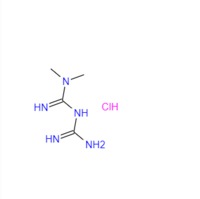metformin HCL
Specifications
| Metformin hydrochloride is a biguanide oral hypoglycemic agent , also known as Glucophage, its hypoglycemic effect is weaker than phenformin, the main role is to reduce the glucagon secretion of A cells ,and to promote the conversion of glucose to glycogen, its characteristic effect including that it does not stimulate pancreatic β-cells to secrete insulin . The follows are hypoglycemic mechanisms: 1. Increasing the sensitivity of peripheral tissues to insulin, increase insulin-mediated glucose utilization. 2. Increasing glucose utilization of non-insulin-dependent tissues, such as brain, blood cells, kidney medulla, intestine, skin and so on. 3. Inhibiting hepatic gluconeogenesis effect , reducing hepatic glucose output. 4. Inhibiting glucose uptake by intestinal cells. 5. Inhibiting the biosynthesis and storage of cholesterol , lowering blood triglycerides and total cholesterol levels. Metformin hydrochloride is clinically used for the treatment of type Ⅱ diabetes patients who are not satisfied with simple diet control, especially patients with obesity and hyperinsulinemia, usage of this drug not only displays no hypoglycemic effect, but also there may be weight loss and hyperinsulinemia effect. For some patients with poor efficacy of sulfonylurea ,it may be effective, if it is used with hypoglycemic drugs including sulfonylurea, intestinal glucosidase inhibitors or thiazolidinediones, the results are better than used alone. It can also be used in patients with insulin therapy to reduce the amount of insulin. |
- Country: China (Mainland)
- Business Type: Hangzhou Huisheng Biotech Pharmaceutical Co.,Ltd
- Market: The Middle East,Europea,Russia,and South America and US market
- Founded Year: 2002
- Contact: Tibi Teng








